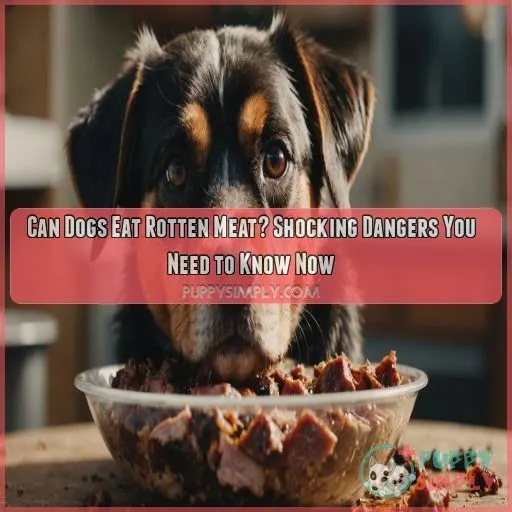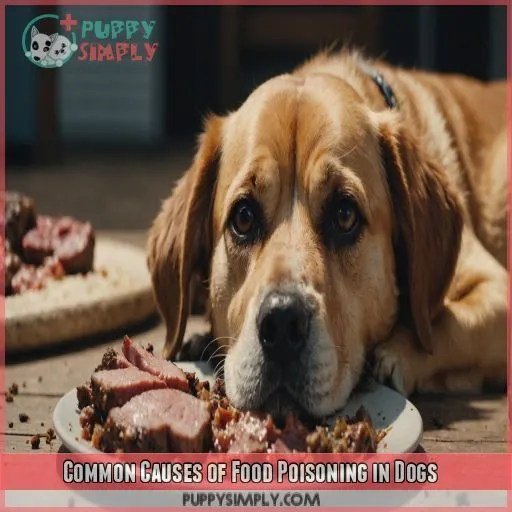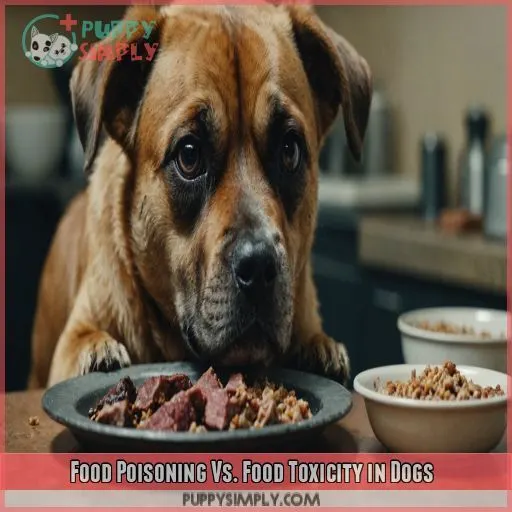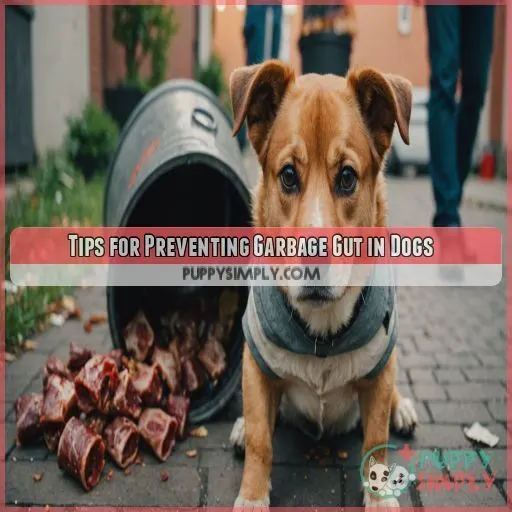This site is supported by our readers. We may earn a commission, at no cost to you, if you purchase through links.
 Feeding your dog rotten meat is a big no-no.
Feeding your dog rotten meat is a big no-no.
If your furry friend ingests spoiled meat, it can lead to serious health issues like food poisoning, vomiting, and even organ damage.
Rotten meat is a breeding ground for bacteria like Salmonella and E. coli, which can wreak havoc on your dog’s digestive system.
So, what’s a pet parent to do?
For starters, store meat properly, check expiry dates, and cook it thoroughly to kill those nasty bacteria.
Want to know more about keeping your pup safe from Food Poisoning? Let’s get into it!
Table Of Contents
- Key Takeaways
- Can Dogs Eat Rotten Meat?
- What Happens if a Dog Eats Spoiled Food?
- Understanding Canine Digestion and Dietary Habits
- Common Causes of Food Poisoning in Dogs
- Food Poisoning Vs. Food Toxicity in Dogs
- Tips for Preventing Garbage Gut in Dogs
- What to Do if Your Dog Gets Food Poisoning
- Frequently Asked Questions (FAQs)
- What happens if a dog eats rotten meat?
- Can dogs eat meat that has gone bad?
- Can animals eat spoiled meat?
- Can dogs get sick from eating spoiled food?
- Can dogs develop long-term health issues from eating spoiled meat?
- How does a dogs age affect its ability to digest spoiled food?
- Are certain breeds more resistant to food poisoning than others?
- Can dogs transmit foodborne illnesses to their human family members?
- Are there any home remedies for treating food poisoning in dogs?
- Conclusion
Key Takeaways
- Don’t risk it – if you’re unsure whether the meat is spoiled, it’s better to err on the side of caution and discard it. Your dog’s health is worth it, and food poisoning can be a real party pooper (and a potentially life-threatening one, at that).
- You’re not a superhero, and neither is your dog – while dogs have a more resilient digestive system than humans, they’re not immune to food poisoning. So, keep those trash cans tightly sealed and avoid feeding your dog spoiled meat.
- Prevention is key – store meat and food properly, check expiration dates, and cook thoroughly to kill bacteria. Your dog (and your vet) will thank you for being proactive about their health.
- If you suspect your dog has food poisoning, don’t panic – but do act fast. Induce vomiting (if advised by your vet), offer a bland diet, and monitor symptoms closely. And remember, it’s always better to be safe than sorry – if in doubt, get your furry friend to the vet promptly.
Can Dogs Eat Rotten Meat?
You’re probably wondering if it’s safe for your dog to eat that questionable meat that’s been sitting in the fridge for a while.
The answer is a resounding no.
Feeding your dog rotten meat can lead to serious health issues, including food poisoning, vomiting, and even organ damage.
It’s really important to understand the risks and take steps to protect your furry friend.
Risks of Spoiled Meat for Dogs
You’re probably wondering, can dogs eat rotten meat?
The answer is a resounding no.
Spoiled meat can harbor bacteria like Salmonella and E. coli, which can lead to food poisoning, dehydration, and even liver damage.
Mycotoxins from moldy meat can also wreak havoc on your dog’s gastrointestinal system.
It’s super important to keep rotten meat out of reach to avoid these risks.
Symptoms of Food Poisoning in Dogs
If your dog eats rotten meat, watch for vomiting, diarrhea (possibly bloody), abdominal pain, loss of appetite, and lethargy. Dehydration is a serious symptom requiring immediate veterinary care. These signs can appear within hours or days after consumption. Don’t hesitate to seek help if you notice any of these red flags – your dog’s health depends on it.
Preventing Dogs From Eating Spoiled Meat
Preventing dogs from eating spoiled meat is really important for their health.
Store meat properly, check expiry dates, and cook it thoroughly to kill bacteria.
Avoid giving leftovers that have been lying around.
Regular kitchen cleanup and proper pet waste disposal also help prevent garbage gut.
Safe Alternatives for Your Dog’s Diet
Considering safe alternatives for your dog’s diet? You can opt for lean meats like boiled chicken or beef, and healthy snacks like apples, carrots, or green beans. Consult your vet before introducing new foods. Prioritize your dog’s health by choosing a balanced diet that meets their nutritional needs, whether it’s commercial dog food or homemade.
What Happens if a Dog Eats Spoiled Food?
If your dog eats spoiled food, you’re probably worried sick about what could happen next. Let’s break down the potential risks and what you can do to help your furry friend feel better – and hopefully avoid a trip to the vet.
Urgent Care for Food Poisoning
If your dog eats spoiled food, every minute counts. If it’s been less than 2-3 hours, induce vomiting with 3 tablespoons of 3% hydrogen peroxide mixed with food or ice cream. If vomiting doesn’t occur within 10 minutes, repeat the dose once. If still no vomiting, rush to the vet. Prompt action can save your dog’s life.
Post-Vomiting Care for Dogs
After your dog vomits, it’s important to monitor their hydration and provide a bland diet to help their stomach recover. You’ll want to keep a close eye on their behavior and watch for any signs of distress. Here are some post-vomiting care tips:
- Hydrate: Offer small amounts of water or an electrolyte-rich drink to prevent dehydration.
- Bland Diet: Feed a mix of 1/3 boiled, lean meat (like chicken or beef) and 2/3 white rice.
- Observe: Monitor your dog’s behavior, watching for signs of lethargy, vomiting, or diarrhea.
- Rest: Give your dog plenty of rest to aid in their recovery.
Signs of Food Poisoning in Dogs
If your dog eats spoiled food, watch for signs of food poisoning like vomiting, diarrhea, dehydration, and loss of appetite. A painful belly, fever, or refusal to eat are also red flags. If you notice any of these symptoms, seek immediate veterinary care. Prompt treatment can save your dog’s life, so don’t hesitate to act.
Understanding Canine Digestion and Dietary Habits
You’re probably wondering how your dog’s digestive system can handle the occasional rotten snack, and the answer lies in their unique physiology. As a dog owner, understanding how your furry friend’s body processes food – and what happens when they eat spoiled meat – can help you make informed decisions about their diet and health.
Dogs’ Digestive Systems and Spoiled Meat
You’re probably wondering how your dog’s digestive system handles spoiled meat. Well, dogs have a more resilient digestive system than humans, with higher stomach acid levels that can kill bacteria in raw or rotten meat. However, this doesn’t mean they’re immune to food poisoning. Here are some key facts to keep in mind:
- Dog stomach acid is designed to break down protein-rich foods, including raw meat.
- Raw meat digestion is faster in dogs due to their shorter digestive tract.
- Spoiled food can still cause dehydration and electrolyte imbalances in dogs.
- Fresh food is always safer than spoiled food for your dog.
- Dog food safety depends on proper handling, storage, and cooking of meat.
Dietary Habits and Adaptations in Dogs
As you navigate your dog’s dietary habits, remember that their adaptations can be both a blessing and a curse. While they can digest some spoiled food, it’s not a free pass to feed them anything. Consider their breed, age, and health when introducing new foods, and be aware of potential dog food sensitivities and digestive enzyme imbalances.
Importance of a Balanced Diet for Dogs
You want the best for your furry friend, and that starts with a balanced diet. A well-nourished dog is better equipped to handle the occasional slip-up, like eating spoiled meat. Focus on providing a high-quality dog food that meets your dog’s nutritional needs. Here are three tips to get you started:
- Choose a reputable dog food brand that uses whole ingredients and avoids fillers.
- Consider your dog’s life stage and lifestyle when selecting a food – puppies, adults, and seniors have different needs.
- Consult with your vet before making any significant changes to your dog’s diet, especially if you’re considering a raw food diet or homemade recipes.
Common Causes of Food Poisoning in Dogs
You’re probably aware that dogs will eat just about anything, from table scraps to trash bin treasures. But some common culprits of food poisoning in dogs include garbage raiding, dead animals, and even recalled dog treats.
Garbage and Compost
Keeping your dog’s curious nose out of trouble when it comes to garbage and compost is super important. Compost toxins and bacteria from food scraps can really mess up their digestive system. Make sure your compost is stored safely and don’t leave garbage cans open. Your dog’s health is worth the extra precaution – keep those garbage dangers at bay!
Dead Animals and Fecal Matter
You’re probably aware that your dog’s scavenging behavior can lead to trouble. Dead animals and fecal matter are common causes of food poisoning in dogs. To keep your furry friend safe, prevent access to these hazards:
- Dead animals in your yard or neighborhood
- Feces from other animals in parks or on walks
- Decaying carcasses in woods or fields
Recalled Dog Food or Treats
You’re probably aware that recalled dog food or treats can be a common cause of food poisoning in dogs. Keep an eye out for recalled brands and watch for symptoms like vomiting, diarrhea, and lethargy. If you suspect your dog has eaten recalled food, contact your vet and explore legal recourse if necessary. Prevention is key, so stay informed!
Raw/Undercooked Food and Human Foods
When it comes to raw or undercooked food and human foods, you need to be extra cautious to avoid food poisoning in your dog. Raw meat, in particular, can harbor bacteria like Salmonella and E. coli, which can be deadly for your furry friend. Here are some common culprits to watch out for:
- Raw or undercooked meat, poultry, or fish: These can contain bacteria like Salmonella and E. coli.
- Uncooked eggs: These can contain Salmonella, which can cause food poisoning in dogs.
- Unpasteurized dairy products: These can contain bacteria like E. coli and Salmonella.
- Table scraps with onions, garlic, or chives: These belong to the Allium family and can be toxic to dogs.
Food Poisoning Vs. Food Toxicity in Dogs
You’re probably aware that dogs can get sick from eating spoiled food, but did you know that some foods are actually toxic to them, even if they’re fresh? In this section, we’ll break down the differences between food poisoning and food toxicity in dogs, so you can keep your furry friend safe and healthy.
Human Foods That Are Toxic for Dogs
You want to keep your furry friend safe from toxic foods. Here’s the lowdown: some human foods can be poisonous to dogs. Check out this table:
| Toxic Food | Why It’s Bad |
|---|---|
| Onions, Grapes, Chocolate | Can cause anemia, kidney failure, or seizures |
| Macadamia Nuts | Can lead to weakness, depression, and tremors |
| Alcohol | Can cause vomiting, diarrhea, and even coma |
Keep these foods out of reach to avoid a potentially disastrous situation!
Table Scraps and Sidewalk Snacks
It’s super important to be mindful of what you’re sharing with your furry friend when it comes to table scraps and sidewalk snacks.
Human food can be toxic to dogs, so stick to safe treats like carrots, green beans, and apples.
Avoid giving your dog human food, and instead, focus on a balanced dog diet to keep them healthy and happy.
Differences Between Food Poisoning and Food Toxicity
Now that you know table scraps and sidewalk snacks can harm your furry friend, it’s important to understand the differences between food poisoning and food toxicity. Food poisoning occurs when your dog ingests contaminated food, while food toxicity happens when they eat something toxic, like chocolate or grapes. Here are some key differences to keep in mind:
- Food poisoning is usually caused by bacteria, viruses, or parasites, while food toxicity is caused by consuming toxic substances.
- Food poisoning symptoms include vomiting, diarrhea, and stomach pain, while food toxicity symptoms can range from mild to severe and include seizures, tremors, and even death.
- Treatment for food poisoning typically involves supportive care, while treatment for food toxicity may require hospitalization and medication.
- Prevention is key for both food poisoning and food toxicity – keep toxic substances out of reach and handle food safely.
- If you suspect your dog has ingested something toxic, seek veterinary care immediately.
Tips for Preventing Garbage Gut in Dogs
You want to keep your furry friend safe from the dangers of garbage gut, but it can be tough to know where to start. By following a few simple tips, you can reduce the risk of your dog getting food poisoning from spoiled meat and keep them happy and healthy.
Proper Storage of Meat and Food
To keep your furry friend safe, store meat and food properly. Keep your refrigerator at 40°F (4°C) or below, and use airtight containers to prevent cross-contamination. Cook or freeze meat within a day or two of purchase, and thaw it safely in the fridge or cold water. Manage leftovers wisely – if in doubt, toss it out!
Regularly Checking Expiry Dates
Keeping your dog safe from food poisoning is super important. You wouldn’t eat expired food, so why risk it with your furry friend? Always check the "best by" or "use by" dates on meat and dog food. If it’s past its prime, be safe and toss it out to make sure your dog stays healthy.
Cooking Meat Thoroughly
Now that you’re checking those expiry dates, it’s time to cook that meat thoroughly! When cooking for your dog, remember:
- Use a meat thermometer to make sure the internal temperature reaches at least 165F (74C).
- Follow safe cooking times to kill bacteria and parasites.
- Choose proper cooking methods, like boiling or baking, to prevent undercooking.
Avoiding Leftovers and Spoiled Food
To prevent garbage gut in dogs, avoid giving them leftovers that have been lying around for a while. Regularly check expiration dates and store food properly. A balanced diet of commercial dog food can also help. Don’t risk your dog’s health with spoiled food – it’s just not worth it. Prioritize their safety and well-being instead.
What to Do if Your Dog Gets Food Poisoning
If your dog has eaten spoiled meat, you’re probably panicking – and rightfully so. Your priority now is to recognize the signs of food poisoning, get your dog the right treatment, and take steps to prevent this scary situation from happening again.
Recognizing the Signs of Food Poisoning
If your dog’s eaten spoiled meat, watch for vomiting, diarrhea, lethargy, abdominal pain, and loss of appetite. These symptoms can pop up within hours or days. Keep a close eye on your dog’s behavior and stool quality. If you notice any of these signs, don’t panic – just get ready to take action to help your furry friend feel better.
Seeking Immediate Veterinary Care
If you suspect your dog has food poisoning, don’t panic! Seek immediate veterinary care. Here are 4 reasons why:
- Prompt treatment is key: Delaying care can lead to severe complications.
- Vet costs can add up: Early intervention can reduce costly treatments.
- Poisoning symptoms can worsen: Quick action can prevent further suffering.
- Your dog’s life is at risk: Don’t gamble with their health – act fast!
Administering First Aid and Treatment
If your dog gets food poisoning, act fast! Induce vomiting with 3% hydrogen peroxide, if advised by your vet. Then, offer a bland diet of boiled chicken or hamburger with white rice. Add canned pumpkin to firm up stool. Monitor symptoms closely and seek vet care if they worsen. Administer Pepcid-AC to reduce stomach acid.
| Symptom | Action |
|---|---|
| Vomiting | Induce vomiting with hydrogen peroxide (if advised by vet) |
| Diarrhea | Offer bland diet with canned pumpkin |
| Abdominal pain | Administer Pepcid-AC to reduce stomach acid |
| Lethargy | Monitor closely and seek vet care if worsening |
| Dehydration | Seek immediate vet care |
Preventing Future Incidents of Food Poisoning
Now that your dog’s food poisoning is under control, it’s time to prevent future incidents. You can start by implementing these simple yet effective habits:
- Proper Dog Food Storage: Store dog food in airtight containers to prevent spoilage.
- Food Safety Tips: Regularly check expiry dates and handle raw meat safely.
- Kitchen Cleanup: Clean up crumbs and spills immediately to avoid attracting your dog.
- Pet-Proofing Home: Secure trash cans and keep toxic substances out of reach.
Frequently Asked Questions (FAQs)
What happens if a dog eats rotten meat?
If your dog eats rotten meat, it can get food poisoning from bacteria like Salmonella and E. coli, causing vomiting, diarrhea, and stomach pain. Keep a close eye on your dog and seek vet care immediately if symptoms persist.
Can dogs eat meat that has gone bad?
You might be tempted to let your dog scarf down that spoiled steak, but don’t give in! It’s not worth the risk. Dogs can get very sick from eating bad meat.
Can animals eat spoiled meat?
Animals, including dogs, shouldn’t eat spoiled meat. It can make them very sick with food poisoning, leading to serious health issues. Keep ’em safe and stick to fresh, pet-approved treats.
Can dogs get sick from eating spoiled food?
A dog’s digestive system is like a double-edged sword. Yes, your furry friend can get sick from eating spoiled food. Their resilient stomachs can handle some bacteria, but it’s not a free pass to feast on rotten treats.
Can dogs develop long-term health issues from eating spoiled meat?
Yes, long-term health issues can develop. It can lead to liver damage and other organ problems if untreated. Food poisoning symptoms include vomiting, diarrhea, pain, and fever. So, it’s really important to act fast.
How does a dogs age affect its ability to digest spoiled food?
A dog’s ability to tolerate spoiled food decreases with age. Their digestive system weakens, making older dogs more susceptible to food poisoning from rotten meat.
Are certain breeds more resistant to food poisoning than others?
While some breeds may have a more robust digestive system, no breed is completely resistant to food poisoning. You should always prioritize safe food handling and monitor your dog’s health, regardless of breed or age.
Can dogs transmit foodborne illnesses to their human family members?
You’re basically a ticking time bomb for your family if your dog gets food poisoning – they can transmit Salmonella and E. coli to you through their feces, vomit, or even just a sloppy lick on the face.
Are there any home remedies for treating food poisoning in dogs?
If you suspect your dog has food poisoning, try inducing vomiting with hydrogen peroxide, then offer a bland diet like boiled chicken and white rice. However, always consult your vet for proper guidance and care.
Conclusion
Imagine coming home to a trash can raid, with your furry friend proudly holding a rotten chicken carcass in its mouth. It’s a recipe for disaster.
As a pet parent, it’s really important to know the dangers of can dogs eat rotten meat.
By storing food properly, checking expiry dates, and cooking thoroughly, you can prevent food poisoning.
Keep your pup safe by being mindful of their diet and taking immediate action if you suspect food poisoning.












